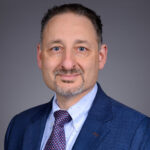Living with epilepsy presents challenges affecting many aspects of life. While medications and other treatments help manage seizures, more than 1 million people continue to have seizures that impact their daily activities. The UofL Physicians – Epilepsy Center provides comprehensive and compassionate services for adults who have seizure disorders, including Psychogenic Nonepileptic Seizures (PNES). Our professionals are committed to providing skilled and compassionate care that focuses on achieving successful outcomes, continuity of care and quality of life.
Epilepsy is a chronic neurological condition that produces sudden disturbances in the normal electrical function of the brain. This causes seizures that affect an individual’s awareness, movement, sensations or behavior. More than 3 million Americans have been diagnosed with epilepsy, and 200,000 new cases occur each year.
The UofL Physicians – Epilepsy Center offers a multidisciplinary approach to epilepsy care, with neurologists and neurosurgeons working closely with epilepsy patients to diagnose the disease and develop a tailored plan to treat the condition with medication and when appropriate, groundbreaking surgery options.
While medications and other treatments help many people of all ages who live with epilepsy, more than 1 million people continue to have seizures that can severely limit their school achievements, employment prospects and participation in all of life’s experiences. It strikes most often among the very young and the very old, although anyone can develop epilepsy at any age.
Diseases and Conditions
Types of Seizures
There are many types of epilepsy. All types cause seizures. It can be hard to determine what type of epilepsy you have because of the numerous possible causes. Different types of seizures can occur in the same person, and the types may affect each person differently. Some specific types of seizures are:
- Generalized seizure: These seizures appear to start in the whole brain at once on EEG (electroencephalograpy—brain wave recording). They are manifested by immediate loss of consciousness and usually jerking convulsions of the arms and legs.
- Partial complex seizure: People with this seizure type may or may not experience a warning, then lose contact, stare, and may have automatic movements of hands with swallowing and lip-smacking. People will not usually remember what they did during the seizure.
- Simple partial seizure: Seizures of this type may start with jerking of a limb or the face, but it may end with a generalized convulsive seizure with loss of consciousness.
- Drop attacks: A very disabling seizure type in which people with no warning fall to the ground, often violently and frequently injuring themselves. This seizure is usually a generalized seizure type.
Types of Epilepsy
Just as there are many different kinds of seizures, there are many different kinds of epilepsy. Doctors have identified hundreds of different epilepsy syndromes — disorders characterized by a specific set of symptoms that include epilepsy. Some of these syndromes appear to be hereditary. For other syndromes, the cause is unknown. Epilepsy syndromes are frequently described by their symptoms or by where in the brain they originate. The professionals within the UofL Physicians – Epilepsy Center discuss the implications of the type of epilepsy with their patients to assist them in understanding the full range of symptoms, the possible treatments and the prognosis.
Absence Epilepsy
People with absence epilepsy have repeated seizures that cause momentary lapses of consciousness. These seizures almost always begin in childhood or adolescence, and they tend to run in families, suggesting that they may be at least partially due to a defective gene or genes. Some people with absence seizures have purposeless movements during their seizures, such as a jerking arm or rapidly blinking eyes. Others have no noticeable symptoms except for brief times when they are “out of it.” Immediately after a seizure, the person can resume whatever he or she was doing. However, these seizures may occur so frequently that the person cannot concentrate in school or other situations. Childhood absence epilepsy usually stops when the child reaches puberty. Absence seizures usually have no lasting effect on intelligence or other brain functions.
Benign Focal Childhood Epilepsy
Benign focal childhood epilepsy causes muscles all over the body to stiffen and jerk. These seizures usually occur at night. Typically this epilepsy syndrome is well controlled with medicine and most children will grow out of this epilepsy.
Childhood and Juvenile Absence Epilepsy
Childhood and juvenile absence epilepsy causes staring into space, eye fluttering and slight muscle jerks.
Infantile Spasms (West syndrome)
Infantile spasms (West syndrome) causes muscle spasms that affect a child’s head, torso and limbs. Infantile spasms usually begin before the age of six months.
Juvenile Myoclonic Epilepsy
Juvenile myoclonic epilepsy causes jerking in the shoulders or arms.
Lennox-Gastaut Syndrome
Lennox-Gastaut syndrome causes frequent and several different types of seizures to occur. This syndrome can lead to falls due to drop attacks during a seizure, which can cause an injury.
Temporal Lobe Epilepsy
Temporal lobe epilepsy, or TLE, is the most common epilepsy syndrome with focal, also known as partial, seizures. These seizures are often associated with auras, a feeling or other type of warning when a seizure is coming. TLE often begins in childhood. Research has shown that repeated temporal lobe seizures can cause a brain structure called the hippocampus to shrink over time. The hippocampus is important for memory and learning. While it may take years of temporal lobe seizures for measurable hippocampal damage to occur, this finding underlines the need to treat TLE early and as effectively as possible.
Neocortical Epilepsy
Neocortical epilepsy is characterized by seizures that originate from the brain’s cortex, or outer layer. The seizures can be either focal or generalized. They may include strange sensations, visual hallucinations, emotional changes, muscle spasms, convulsions and a variety of other symptoms, depending on where in the brain the seizures originate.
Other Types of Epilepsy
There are many other types of epilepsy, each with its own characteristic set of symptoms. Many of these begin in childhood, including Lennox-Gastaut syndrome and Rasmussen’s encephalitis. Children with Lennox-Gastaut syndrome have severe epilepsy with several different types of seizures, including atonic seizures, which cause sudden falls and are also called drop attacks. This severe form of epilepsy can be very difficult to treat effectively. UofL Physicians – Epilepsy Center physicians will consult with each patient and their family to outline a treatment plan based on their individualized goals.
Some epilepsy syndromes are easily treated, do not seem to impair cognitive functions or development and usually stop spontaneously. Some epilepsies like this include benign infantile encephalopathy and benign neonatal convulsions. Other syndromes, such as early myoclonic encephalopathy, have neurological and developmental problems. However, these problems may be caused by underlying neurodegenerative processes rather than by seizures. Epilepsy syndromes in which the seizures and/or the person’s cognitive abilities get worse over time are called progressive epilepsy.
UofL Physicians - Epilepsy Center offers both consultations and ongoing care management to patients with seizure disorders. Our physicians are professors and researchers with the University of Louisville School of Medicine and are at the forefront of new technology and treatment options.
Treatments and Services
Comprehensive Evaluation and Care
The first step in designing a treatment program is a comprehensive evaluation. Evaluations for patients with seizures require an interdisciplinary approach. The center is staffed by neurology experts in epilepsy, epilepsy neurosurgeons, psychiatrists, neuropsychologists, neurodiagnostic technologists, epilepsy nurse specialists, epilepsy coordinators and additional staff with special expertise in seizure disorders.
Services include:
- Counseling
- Education
- Individualized treatment plans
- Neuropsychological examination
- Epilepsy monitoring unit
- Long-term epilepsy care management
- Medication and side-effect assessment
- Surgery assessment
- Epilepsy surgery resection/laser interstitial thermal therapy (LITT)
- Responsive neurostimulation (RNS)
- Deep brain stimulation (DBS)
- Psychosocial support
- State-of-the-art digital and video EEG screening and monitoring
- Vagal nerve stimulation
- Rehabilitation
Treatment Options
Our physicians are at the forefront of anti-epileptic drug research through their work with the University of Louisville School of Medicine. While the first consideration for managing seizures is medication, about 30 percent of patients with seizure disorders do not respond to this course of action.
Patients with medically refractory seizures (seizures that cannot be controlled with medication) are offered an evaluation to assess whether they are candidates for epilepsy surgery or the implantation of devices such as the vagus nerve stimulator.
Epilepsy Monitoring Unit
Our epilepsy monitoring unit (EMU) is dedicated to providing quality care, diagnosis and treatment for epilepsy patients in a state-of-the-art facility. Using the latest equipment and procedures, our specialists can capture an event or seizure and correlate that with video and medical imaging to truly diagnose whether or not a seizure is occurring. A family member is encouraged to accompany the patient throughout his or her stay. The unit features large, comfortable, private rooms that are fully equipped and monitored throughout the night. During monitoring in the EMU, seizure medications may be decreased or temporarily discontinued. Prior to discharge from the hospital, medications are reintroduced and/or modified based on the information obtained. The EMU is staffed 24 hours by nurses who are specially trained to care for epilepsy patients.
Epilepsy Surgery
After all required epilepsy workup is completed, a patient with difficult to control seizures has the option of epilepsy surgery done by an expert in the field. This is tailored to the patient’s preferences and case and could consist of laser interstitial thermal therapy (LITT) or resective surgery, aimed at removing the abnormal brain tissue where seizures originate.
Responsive Neurostimulation (RNS)
RNS is a new device that reduces and occasionally may even eliminate seizures and involves implanting short electroencephalogram (EEG) leads in the brain that record continuously the brain activity and deliver treatment when a seizure occurs.
Deep Brain Stimulator (DBS)
DBS involves implanting EEG leads in a target area of the brain with the purpose of lowering the number of seizures in patients, in which medications did not show enough efficacy.
Vagal Nerve Stimulation
For many people with epilepsy, anti-seizure medicines provide relief. For patients whose seizures are not controlled by medication, vagal nerve stimulation (VNS) may be an option. VNS is designed to control seizures by sending small pulses of electrical energy to the brain through a small implant.
Epilepsy Rehabilitation
It is not unusual for individuals with epilepsy to need rehabilitation services. Seizures may result in lasting problems with strength, balance and cognition. A physiatrist assessment can lead to prescribing the correct medications, therapies and equipment to improve function and quality of life.


 UofL Health – Brain & Spine Institute
UofL Health – Brain & Spine Institute








